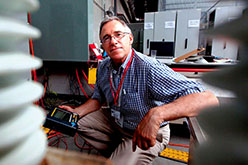Siemens and QUT partner for Defence innovation
SIEMENS has signed a historic research agreement with Defence Science and Technology Group and the Queensland University of Technology (QUT) to advance the use of high temperature superconducting (HTS) in Australia.
The partnership will conduct research into HTS and explore its applications to Australia’s maritime defence and industrial power requirements with the intent to transition research findings into technology that can be trialled in naval applications. 
HTS technologies under development today in superconducting motors, generators and magnets can carry high-density currents with virtually no loss and have the potential to reduce the size and weight of conventional motors by more than 30 percent.
Siemens Australia CEO, Jeff Connolly, said the unique partnership reinforces Siemens’ proud record of introducing technologies that matter to Australia. It exemplifies the benefits of a strong bilateral relationship between Australia and Germany.
“For the Australian Navy, this partnership opens a pathway to more energy-efficient vessels with huge leaps forward in size, weight and capacity. HTS will also mean less environmental impact and reduced operating costs,” Mr Connolly said.
“Imagine the benefits of a motor with the same power but 30 percent less size and weight!”
With this partnership, Siemens is investing 15 years of HTS knowledge to develop the next generation of Australian HTS experts. This five year agreement starts with an initial investment of about $2.5 million – some $2 million in equipment and resources and $0.5 million in research and development (R&D) hours has been committed. This will increase as new projects are initiated under the collaboration.
Mr Connolly said the partnership is aligned to the Federal Government’s vision for advanced manufacturing where innovation and R&D is closely aligned to the practical needs of the country. He said the application of HTS technologies is not limited to defence industries and could revolutionise other high energy-use sectors such as power and transport.
Defence Science and Technology Group has strategic alliances with 12 defence companies and research agencies. They partner with 28 universities across Australia to deliver game-changing capability for the future of the Australian Defence Force and continue to seek opportunities to expand this network.
Chief Defence scientist Alex Zelinksy said the partnership will focus on transitioning research to outcomes that can deal with real world problems, starting with its potential applications to defence.
“This agreement is in line with our strategic goal to partner with the best talents in industry and academia to achieve a capability edge for defence,” Dr Zelinsky said.
QUT deputy vice-chancellor for Research and Commercialisation, Arun Sharma said the university was uniquely equipped to undertake this research and development because of its expertise and facilities, including the Banyo Pilot Plant Precinct, a leading specialist research centre for structural, mechanical and electrical engineering.
“QUT’s purpose-built facility has specialist capabilities for large-scale engineering research, testing and validation,” Professor Sharma said.
“Our partnership with Siemens puts QUT at the international forefront of superconducting motor research, an area of research that has the potential to radically transform many industries including maritime propulsion and transport drive systems.
“As the world strives to find more efficient and cleaner ways to power ships and other forms of large-scale transport, QUT will be testing this superconducting motor and at the same time looking at the other potential uses and benefits of this new technology.
“QUT’s partnership with Siemens is immensely valuable to us as it enables our university to pioneer research into superconducting motors and generators that can potentially replace diesel propulsion by superconducting derived magnetic fields,” Prof. Sharma said.
The announcement was made at the recent Pacific 2015 Maritime Exposition.
Professor Richard Taylor will lead the testing of high temperature superconducting technologies at QUT's Banyo Pilot Plant Precinct.
ends
Professor Richard Taylor will lead the testing of high temperature superconducting technologies at QUT's Banyo Pilot Plant Precinct. Image: QUT.

 How to resolve AdBlock issue?
How to resolve AdBlock issue?